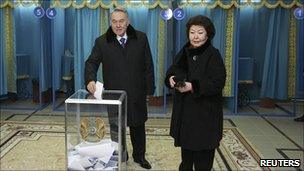Kazakhstan President Nazarbayev wins re-election
- Published

President Nazarbayev has been in power for more than 20 years
Kazakhstan President Nursultan Nazarbayev has won an crushing election victory, saying he now has "carte blanche" to continue national reform.
The country's Central Election Commission said he had won 95.5% of votes, based on partial results.
Mr Nazarbayev, 70, told supporters he would "continue the course of economic, political and social reforms".
International observers criticised the election, saying it failed to meet international democratic standards.
In a statement released on Monday, the Organization for Security and Co-operation in Europe (OSCE) said: "Reforms necessary for holding genuine democratic elections have yet to materialise."
The head of the international monitors in Kazakhstan, Daan Everts, said the vote "could and should have been better".
Before the vote the OSCE - which had nearly 400 monitors in the country - had complained about the lack of transparency, competition and media freedom.
Opponents of Mr Nazarbayev said they did not have enough time to prepare for the election, but supporters said the opposition was weak.
The BBC's Rayhan Demytrie, in Almaty, says there is no doubt that Nursultan Nazarbayev is a popular leader - but the figure of 95.5% of the vote might surprise even his supporters.
They said the anti-Nazarbayev opposition was not able to field a single strong candidate capable of challenging the president.
Under a 2007 constitutional amendment there is no limit on the number of terms the former Communist Party boss may serve in office.
His current term was to have ended in 2012, but he called the early poll after a proposal to cancel the next two elections was ruled unconstitutional.
Three other candidates stood in Sunday's election: environmentalist Mels Yeleusizov, Gani Kasymov of the Party of Patriots of Kazakhstan, and Zhambyl Akhmetbekov of the Communist People's Party of Kazakhstan.
'Prosperity before democracy'
After casting his vote on Sunday, President Nazarbayev said: "The task of modernising the state and society are still huge, so today's vote will determine our unity and our desire to fulfil our plans."
Two exit polls quickly gave him an unassailable lead: Kazakhstan's Association of Sociologists and Politologists gave Mr Nazarbayev 94.82% of the vote, based on an exit poll of 1.2% of those who voted, while the Institute of Democracy gave him 95.1%, based on a sample of 50,000 voters.
In the 2005 election, Mr Nazarbayev won 91.2%.
Nearly 90% of the country's nine million eligible voters cast their ballot, the electoral commission said, up from 76.8% at the last election.
Early voters and 18-year-olds casting their ballot for the first time were rewarded with household goods such as food blenders and electric kettles, according to the Associated Press.
Campaigning for this poll was low-key - the most organised and visible being by the main pro-presidential party Nur Otan, our correspondent says.
Mr Nazarbayev has no real competition, she adds, and no previous elections in Kazakhstan have ever been judged free and fair by independent monitors.
"We have not had fair elections in 20 years," said human rights leader Zauresh Battalova, a former Senate member.
There were several reports that students were forced to vote by threats of expulsion from university.
Writing in the Washington Post last week, external, Mr Nazarbayev argued that economic prosperity should come before democracy.
"Without such strength, as we have seen repeatedly around the world, stability is put at risk and democratic reform can founder," he argued.
- Published3 April 2011
- Published4 February 2011
- Published7 January 2011
- Published14 January 2011